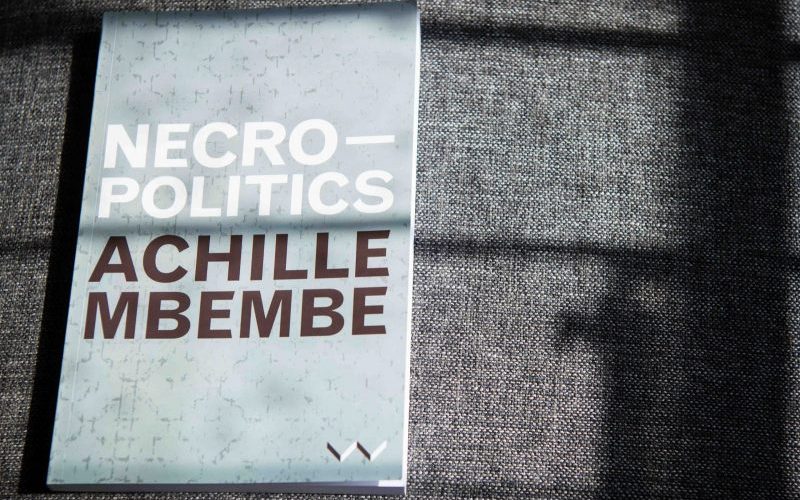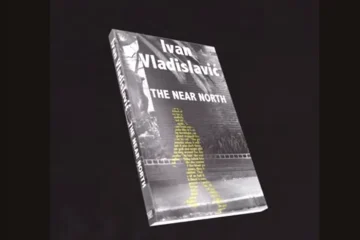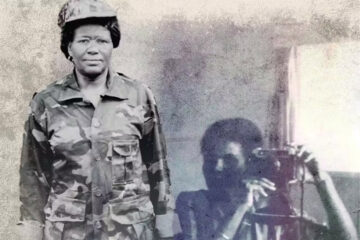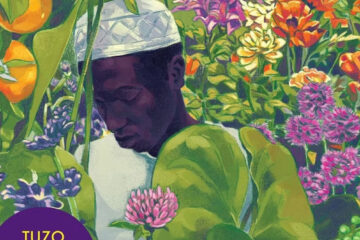Achille Mbembe investigates how death structures the concepts of sovereignty and the political, theorising that the human becomes a subject by confronting death.
This is an excerpt from Achille Mbembe’s Necropolitics (Wits University Press, 2019).
The ultimate expression of sovereignty largely resides in the power and capacity to dictate who is able to live and who must die. To kill or to let live thus constitutes sovereignty’s limits, its principal attributes. To be sovereign is to exert one’s control over mortality and to define life as the deployment and manifestation of power.
This sums up what Michel Foucault meant by biopower: that domain of life over which power has asserted its control. But under what practical conditions is the power to kill, to let live, or to expose to death exercised? Who is the subject of this right? What does the implementation of such a right tell us about the one who is thus put to death and about the relation of enmity that sets such a person against his murderer? Can the notion of biopower account for the contemporary ways in which the political takes as its primary and absolute objective the enemy’s murder, doing so under the guise of war, resistance, or the war on terror? War is, after all, a means of achieving sovereignty as much as a way of exercising the right to kill. When politics is considered a form of war, the question needs to be asked about the place that is given to life, death, and the human body (in particular when it is wounded or slain). How are these aspects inscribed in the order of power?
The work of death
To answer these questions, this essay draws on the concept of biopower and explores this concept’s relation to the notions of sovereignty (imperium) and the state of exception. I would like to examine briefly a number of empirical and philosophical questions that arise in this context. As is well known, the concept of the state of exception has been often discussed in relation to Nazism, totalitarianism, and the concentration/extermination camps. Various interpretations of the death camps in particular have taken them as the central metaphor for sovereign and destructive violence and as the ultimate sign of the absolute power of the negative. As Hannah Arendt puts it, “There are no parallels to the life in the concentration camps. Its horror can never be fully embraced by the imagination for the very reason that it stands outside of life and death.” Because its inhabitants have been divested of political status and reduced to bare life, the camp is, for Giorgio Agamben, “the place in which the most absolute conditio inhumana ever to appear on Earth was realised”. He adds that, in the political-juridical structure of the camp the state of exception ceases to be a temporal suspension of the state of law, acquiring a permanent spatial arrangement that remains continually outside the law’s normal state.
This essay does not aim to debate the singularity of the extermination of the Jews or to hold it up by way of example. I set out from the idea that modernity is at the origin of multiple concepts of sovereignty, and thus also of the biopolitical. Disregarding this multiplicity, late modern political criticism has unfortunately privileged normative theories of democracy and made the concept of reason into one of the most important elements of both the project of modernity and the topos of sovereignty. From this perspective, the ultimate expression of sovereignty is the production of general norms by a body (the demos) comprising free and equal individuals. These individuals are posited as full subjects capable of self-understanding, self-consciousness, and self-representation. Politics, therefore, is doubly defined as a project of autonomy and as the reaching of agreement within a collective through communication and recognition. This, we are told, is what differentiates it from war.
In other words, on the basis of a distinction between reason and unreason (passion, fantasy), late modern criticism has been able to articulate a certain idea of the political, the community, the subject – or, more fundamentally, of the good life, how to achieve it, and how to become, in the process, a fully moral agent. Within this paradigm, reason is the truth of the subject, and politics is the exercise of reason in the public sphere. The exercise of reason amounts to the exercise of freedom, a key element for individual autonomy. The romance of sovereignty, in this case, rests on the belief that the subject is both master and controlling author of his own meaning. Sovereignty is therefore defined as a twofold process of self-institution and self-limitation (fixing one’s own limits for oneself). Exercising sovereignty, in turn, is about society’s capacity for self-creation with recourse to institutions inspired by specific social and imaginary significations.
Several critiques have already been addressed to this strongly normative reading of the politics of sovereignty, so I will not rehearse them here. My concern is those figures of sovereignty whose central project is not the struggle for autonomy but the generalised instrumentalisation of human existence and the material destruction of human bodies and populations. Such figures of sovereignty are far from a piece of prodigious insanity or the expression of a rupture between the impulses and interests of the body and those of the mind. Indeed, like the death camps, these figures constitute the nomos of the political space in which we continue to live. Furthermore, contemporary experiences of human destruction suggest that a reading of politics, sovereignty, and the subject may be developed that differs from the one bequeathed us by the philosophical discourse on modernity. Instead of considering reason as the subject’s truth, we can look to other foundational categories that are less abstract and more tangible, such as life and death.
Hegel’s discussion of the relation between death and “becoming subject” is significant here. His account of death centres on a twofold concept of negativity. First, the human negates nature (a negation that is exteriorised in the human’s effort to reduce nature to human needs); second, the negated element is transformed through work and struggle. By transforming nature, the human being creates a world, but in the process, this human being is also exposed to his own negativity. In the Hegelian paradigm, human death is essentially voluntary. It is the result of the subject’s consciously assuming risks. According to Hegel, through these risks the “animal” that constitutes the human subject’s natural being is defeated.
In other words, the human being thus truly becomes a subject – that is, separated from the animal – in the struggle and work through which death (understood as the violence of negativity) is confronted. Through this confrontation with death, the human being is cast into the incessant movement of history. Becoming a subject therefore supposes upholding the work of death. To uphold the work of death, such is precisely how Hegel defines the life of Spirit. The life of Spirit, he says, is not the life that is frightened of death and spares itself destruction, but the life that assumes death and lives with it. Spirit attains its truth only by finding itself in absolute dismemberment. Politics is therefore a death that lives a human life. Such, too, is the definition of absolute knowledge and sovereignty: risking one’s life as a whole.
Georges Bataille also offers critical insights into how death structures the concepts of sovereignty, the political, and the subject. Bataille displaces Hegel’s conception of the linkages between death, sovereignty, and the subject in at least three ways. First, he interprets death and sovereignty as the paroxysm of exchange and superabundance – or, to use his own terminology: excess. For Bataille, life is defective only when death has taken it hostage. Life itself exists only in bursts and in exchange with death. He argues that death is the putrefaction of life, the stench that is at once life’s source and repulsive condition. So, although it destroys what was to be, obliterates what was supposed to continue being, and reduces to nothing the individual who takes it, death does not amount to the pure annihilation of being. Rather, it is essentially self-consciousness; moreover, it is the most luxurious form of life, that is, of effusion and exuberance: a power of proliferation. Even more radically, Bataille subtracts death from the horizon of meaning. In Hegel, by contrast, nothing is definitively lost in death; indeed, death for him holds great signification as a means to truth.
Second, Bataille firmly anchors death in the realm of absolute expenditure (the other characteristic of sovereignty), whereas Hegel tries to keep death within the economy of absolute knowledge and meaning. Life beyond utility, Bataille says, is the domain of sovereignty. This being the case, death is therefore the point at which destruction, suppression, and sacrifice constitute so irreversible and radical an expenditure – an expenditure without reserve – that they can no longer be determined as negativity. Death is therefore the very principle of excess – an anti-economy. Hence the metaphor of luxury and the luxurious character of death.
Third, Bataille establishes a correlation among death, sovereignty, and sexuality. Sexuality, for him, is inextricably linked to violence and to the dissolution of the body’s and the Self’s boundaries by way of orgiastic and excremental impulses. As such, sexuality concerns two major forms of polarised human impulses – excretion and appropriation – as well as the regime of the taboos surrounding them. The truth of sex, and its deadly attributes, resides in the experience of loss of the boundaries separating reality, events, and fantasised objects. For Bataille, then, sovereignty takes many forms. But it ultimately takes that of a refusal to accept the limits that the fear of death would have the subject respect. The sovereign world, Bataille argues, “is the world in which the limit of death is done away with. Death is present in it, its presence defines that world of violence, but while death is present it is always there only to be negated, never for anything but that. The sovereign,” he concludes, “is he who is, as if death were not … He has no more regard for the limits of identity than he does for limits of death, or rather these limits are the same; he is the transgression of all such limits.” Since the natural domain of prohibitions includes death, among others (eg, sexuality, filth, and excrement), sovereignty requires “the strength to violate the prohibition against killing, although it’s true this will be under the conditions that customs define”. And contrary to the subordination ever rooted in necessity and the alleged need to avoid death, sovereignty definitely calls for the risk of death. By conceiving sovereignty as a violating of prohibitions, Bataille reopens the question of the limits of the political. The political, in this case, is not the forward dialectical movement of reason. It can be traced only as a spiral transgression, as that difference that disorients the very idea of the limit. More specifically, it is the difference put into play by the violation of a taboo. – This article was first published in New Frame.














